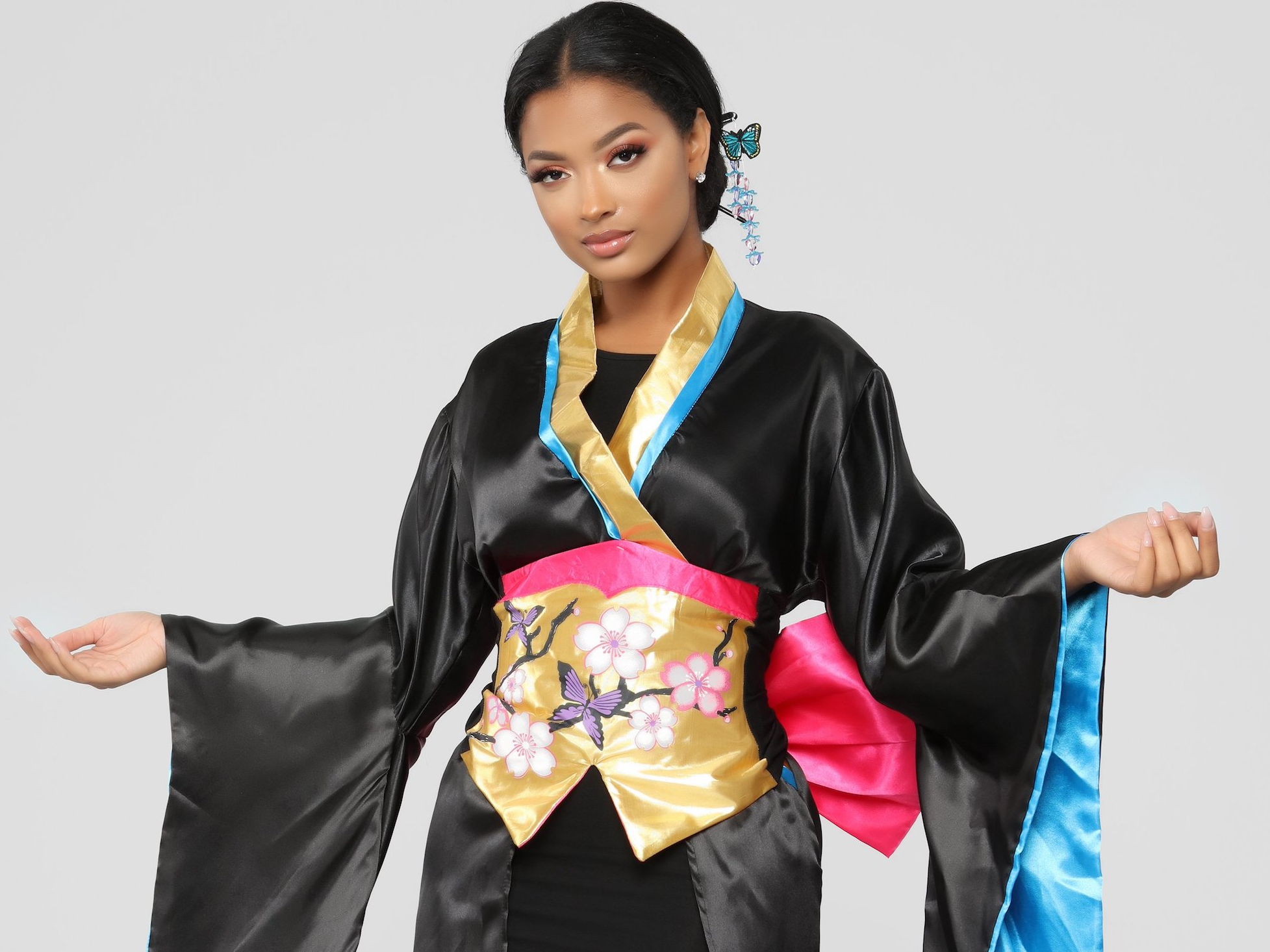- Online retailer Fashion Nova is selling a “geisha” costume, as originally reported by Teen Vogue.
- The $49.99 costume includes a kimono, skirt, an obi, and hair sticks.
- Similar costumes have been slammed by critics who believe they perpetuate exaggerated stereotypes and constitute cultural appropriation.
- In addition, many believe that wearing or selling “sexy” geisha costumes is disrespectful since geishas historically have never been part of the sex industry in Japan.
- Fashion Nova did not immediately reply to INSIDER’s request for comment.
Though retailers release new costumes for Halloween each year, brands still can’t seem to fully shake selling ensembles that many say are culturally insensitive.
Most recently, online clothing store Fashion Nova began selling a $49.99 “geisha” costume, as originally reported by Teen Vogue.
The costume, which comes in sizes small, medium and large, includes a kimono and skirt, a pair of hair sticks, and an obi – a sash that is tied around traditional Japanese outfits or uniforms.

Some believe geisha costumes are an example of cultural appropriation
The term cultural appropriation is used to describe the adoption of elements in a minority culture - typically one that has been historically oppressed or discriminated against - by members of the dominant culture, by those who wield power in a society.
In the US, many have spoken out against Halloween costumes that draw on exaggerated and insensitive cultural stereotypes.
Critics have argued that these costumes - no matter the intention behind them, sexualized or not - should not exist at all, as they allow those who belong in a privileged group to "try on" a culture without experiencing or understanding the history behind it. Meanwhile, when people within that culture wear the same garment, they are often mocked for doing so, or criticized for not assimilating into American society.
That's not to say that people can't appreciate cultures outside their own, or that cultural exchange is inherently wrong. The difference between appreciation and appropriation, critics argue, is that appropriation results from ignorance, from a failure or unwillingness to learn about a culture, or to listen to those within that culture.
Ahead of Halloween this year, many have already taken to Twitter to argue that people's cultures should not be reduced to inaccurate caricatures and stereotypes - like, for example, a "sexy" imitation geisha outfit.
https://twitter.com/tishshres/status/1046721321302978560?ref_src=twsrc%5Etfwhttps://twitter.com/LisasEyeRoll/status/1044999911576662017?ref_src=twsrc%5Etfw
Sup y’all! With Halloween swiftly approaching just a quick reminder that cultures are not costumes. Stg if I see a ‘geisha’, ‘native’, blackface, or any other bullshit I’m straight gonna drop kick a bitch. Thnx
— The Moon is my Girlfriend (@M00N_0NI) September 25, 2018
Just a reminder that Halloween is tons of fun! But please... it is ignorant & insulting to use a race/culture as your costume (native american, gypsy, geisha/asian, POC, etc)
& it isn't edgy to want to wear handmaidens tale outfits as sexy tone deaf b.s.
Be a ghoul, not a fool.— SweetWitch (@SweetWitchCoven) September 24, 2018
https://twitter.com/hell0nessa/status/1044496907526057984?ref_src=twsrc%5Etfwhttps://twitter.com/ArtByKanvis/status/1043561464836104192?ref_src=twsrc%5Etfwhttps://twitter.com/kristanichelle/status/1042886959645941760?ref_src=twsrc%5Etfw
Geishas have a rich history in Japan
As Teen Vogue's Mekita Rivas noted, female geishas became prominent in Japan between 1750 and 1780. According to Tokyo-based travel company, Toki, they originally worked as assistants to the oiran, elite and "very expensive Japanese courtesans."
At the time, according to San Francisco's Asian Art Museum, strict government regulations forbade geishas from forming personal relationships with, or even sitting close to, the courtesans' clients.
During Japan's Meiji period, which lasted from 1868 to 1912, geishas replaced the oiran as the main "providers of hospitality and entertainment at dinner events for large companies and government officials."
But in the early 1900s, according to Toki, US soldiers stationed in Japan following World War II incorrectly referred to a broad category of female Japanese workers - a group that included prostitutes and nightclub hostesses - as "geisha girls."
This American mistake contributed to a global misunderstanding of what geishas are - a warped perception that persists today.
Since geishas historically have never been part of the sex industry in Japan, many argue that wearing or selling "sexy" geisha costumes is disrespectful, as it diminishes the important role of geishas in Japanese culture and perpetuates the westernized misunderstanding of what they do.
Fashion Nova isn't the only retailer selling 'geisha' costumes
Popular retailer Party City, for example, stocks a $30 Adult Pleasing Geisha Costume, which includes a dress, shrug, and choker necklace.

Seasonal retailer Spirit Halloween sells a "geisha" costume as well. The outfit features a pink and black kimono and costs $34.99.

So-called geisha outfits aren't the only type of costumes that people say are problematic
In 2017, retailer HalloweenCostumes.com began selling an outfit called Anne Frank Costume for Girls, which received swift, and widespread, criticism on social media. People argued that the costume not only trivialized genocide, but it also promoted anti-Semitism.
Smiffys - the manufacturing company behind the costume - later told INSIDER that none of the brand's costumes were "designed to allude to or are named 'Anne Frank.'"

And just last month, in September, a website called Yandy began selling a "sexy" Brave Red Maiden Costume, inspired by the red robes described in Margaret Atwood's novel, "The Handmaid's Tale," and the Hulu show by the same name.
In "The Handmaid's Tale," the female characters who must wear these red robes are the same ones who are forced into sexual and reproductive slavery. As such, many felt Yandy's costume was disrespectful.

Fashion Nova did not immediately reply to INSIDER's request for comment.
Visit INSIDER's homepage for more.

